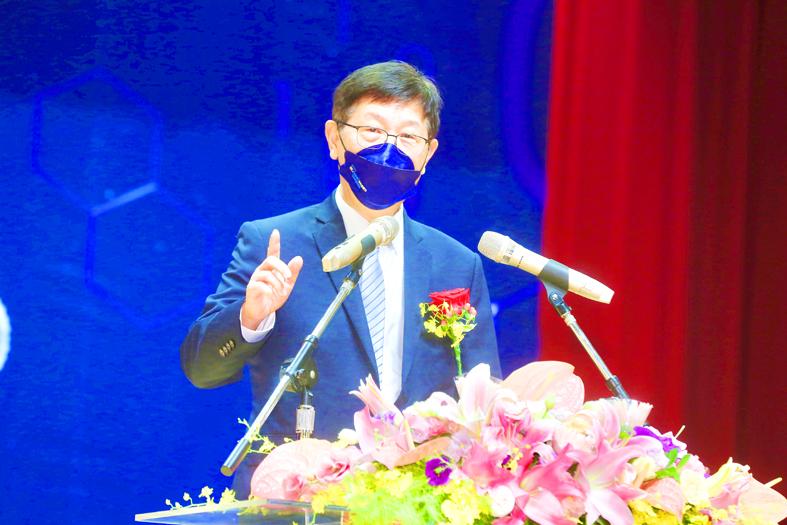Foxconn Technology Group (富士康科技集團) is facing a battle of talent in Vietnam as major suppliers to Apple Inc continue to shift some capacity from China to the Southeast Asian country amid prolonged tensions between Beijing and Washington.
Hon Hai Precision Industry Co (鴻海精密) chairman Young Liu (劉揚偉) said the company’s Chinese rivals in Vietnam have set up operations near its campuses to poach its employees.
Hon Hai is known globally as Foxconn Technology Group.

Photo: Fang Wei-jie, Taipei Times
“The move shouldn’t be condoned,” Liu told reporters in Taipei on Saturday, without naming any companies.
Three of Foxconn’s China-based competitors are now in Vietnam: Luxshare Precision Industry Co (立訊精密) and GoerTek Inc (歌爾聲學) make AirPods in the country, while BYD Co (比亞迪) is preparing to produce iPads.
The key Apple assembly partner employs about 60,000 people in Vietnam, the company’s largest manufacturing base outside of China, Liu said.
Liu said Foxconn plans to “significantly” increase its number of employees in Vietnam over the next one to two years, without providing a specific number.
During former US president Donald Trump’s administration, the US implemented various measures, including tariffs on certain products imported from China, in an attempt to reshape global supply chains.
US President Joe Biden is looking to reconfigure the China tariffs, but US officials have not made major changes so far.
While Foxconn relies on China for most of its production, the world’s largest contract electronics maker has had to make adjustments to mitigate risks from the trade dispute.
The Taiwanese company had planned to move some production of iPads and MacBooks to a new plant in the northern Vietnamese province of Bac Giang, Bloomberg News reported in 2020.
The site was originally slated to begin production last year, with the Vietnamese government saying the company could invest US$700 million that year.
It is unclear whether that site is now up and running, and Liu did not offer an update on the construction progress on Saturday.
Foxconn has been making electronics in Vietnam for several years, dating back to before the US trade dispute with China.

MULTIFACETED: A task force has analyzed possible scenarios and created responses to assist domestic industries in dealing with US tariffs, the economics minister said The Executive Yuan is tomorrow to announce countermeasures to US President Donald Trump’s planned reciprocal tariffs, although the details of the plan would not be made public until Monday next week, Minister of Economic Affairs J.W. Kuo (郭智輝) said yesterday. The Cabinet established an economic and trade task force in November last year to deal with US trade and tariff related issues, Kuo told reporters outside the legislature in Taipei. The task force has been analyzing and evaluating all kinds of scenarios to identify suitable responses and determine how best to assist domestic industries in managing the effects of Trump’s tariffs, he

TIGHT-LIPPED: UMC said it had no merger plans at the moment, after Nikkei Asia reported that the firm and GlobalFoundries were considering restarting merger talks United Microelectronics Corp (UMC, 聯電), the world’s No. 4 contract chipmaker, yesterday launched a new US$5 billion 12-inch chip factory in Singapore as part of its latest effort to diversify its manufacturing footprint amid growing geopolitical risks. The new factory, adjacent to UMC’s existing Singapore fab in the Pasir Res Wafer Fab Park, is scheduled to enter volume production next year, utilizing mature 22-nanometer and 28-nanometer process technologies, UMC said in a statement. The company plans to invest US$5 billion during the first phase of the new fab, which would have an installed capacity of 30,000 12-inch wafers per month, it said. The

‘SWASTICAR’: Tesla CEO Elon Musk’s close association with Donald Trump has prompted opponents to brand him a ‘Nazi’ and resulted in a dramatic drop in sales Demonstrators descended on Tesla Inc dealerships across the US, and in Europe and Canada on Saturday to protest company chief Elon Musk, who has amassed extraordinary power as a top adviser to US President Donald Trump. Waving signs with messages such as “Musk is stealing our money” and “Reclaim our country,” the protests largely took place peacefully following fiery episodes of vandalism on Tesla vehicles, dealerships and other facilities in recent weeks that US officials have denounced as terrorism. Hundreds rallied on Saturday outside the Tesla dealership in Manhattan. Some blasted Musk, the world’s richest man, while others demanded the shuttering of his

Taiwan’s official purchasing managers’ index (PMI) last month rose 0.2 percentage points to 54.2, in a second consecutive month of expansion, thanks to front-loading demand intended to avoid potential US tariff hikes, the Chung-Hua Institution for Economic Research (CIER, 中華經濟研究院) said yesterday. While short-term demand appeared robust, uncertainties rose due to US President Donald Trump’s unpredictable trade policy, CIER president Lien Hsien-ming (連賢明) told a news conference in Taipei. Taiwan’s economy this year would be characterized by high-level fluctuations and the volatility would be wilder than most expect, Lien said Demand for electronics, particularly semiconductors, continues to benefit from US technology giants’ effort